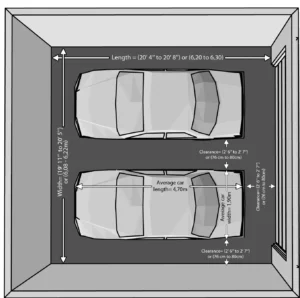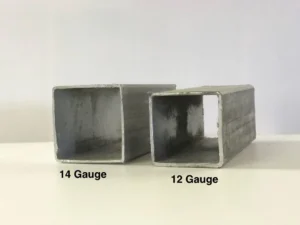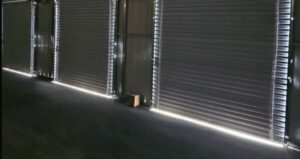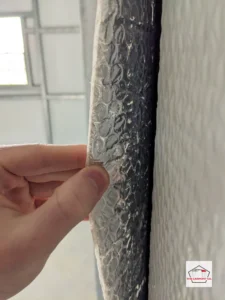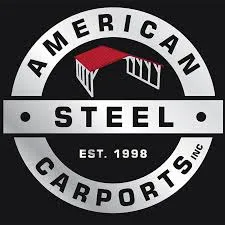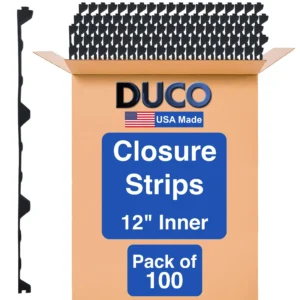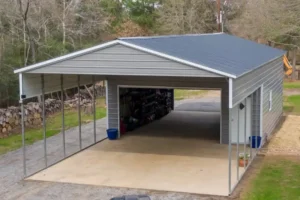8 Minute Read
Cost to Build a Garage: Ultimate 2025 Building Guide
When it comes to adding a garage to your property, understanding the costs involved is crucial. Whether you’re considering an attached garage or detached garage, whether stick-built or made with metal, the price can vary significantly based on materials, size, and customization. In this guide, we’ll break down the costs, explore the benefits of different types of garages, and provide actionable tips to help you make an informed decision.
To speak with a Carport Co. team member, call (888) 293-5588, email [email protected], or request a FREE estimate. You might also find our 3D Garage Builder helpful for visualizing your future metal garage.
Get Started
It’s quick and easy! Get a quote for an engineer stamped metal garage today!

Manufactured in the United States

Competitive Warranties

Licensed and Insured Installers

Outstanding Customer Service
Structures That Stand Strong™
Table of Contents

How Much Does it Cost to Build a Garage?
The cost to build a garage depends on several factors, including its type, size, and the materials used. Here’s a breakdown:
Average Garage Building Costs Overview
Traditional wooden garages are preferred by many due to their appearance and ease of modification. However, they come with a higher upfront cost, and higher maintenance costs over time. A traditional stick-built garage costs between:
- Single-car garage (12×20): $15,000 – $25,000
- Two-car garage (20×20): $25,000 – $35,000
- Three-car garage (30×20): $35,000 – $50,000
- Custom larger garages: $50,000+
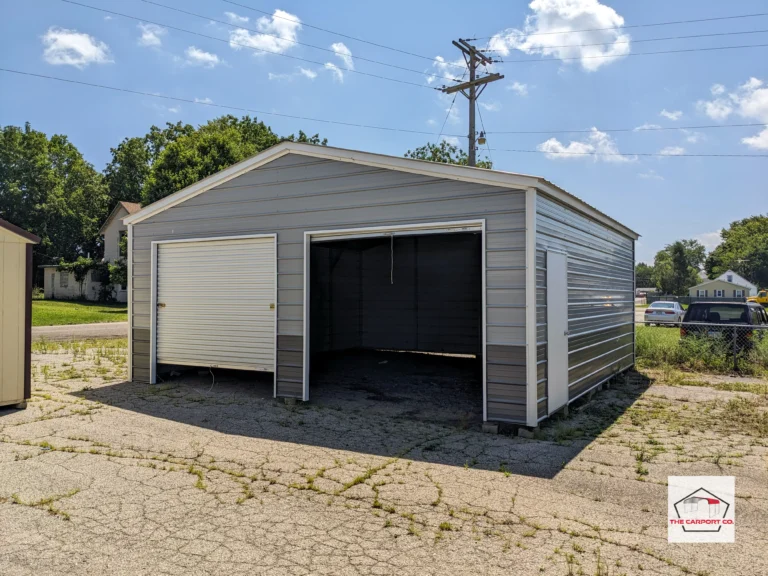
Metal Garage Cost Advantage
Metal garages typically cost 30-40% less than traditional construction while offering enhanced durability and lasting longevity. A metal garage costs between:
- Single-car garage (12×20): $3,500 – $7,000
- Two-car garage (20×20): $6,000 – $12,000
- Three-car garage (30×20): $9,000 – $18,000
- Custom larger garages: $18,000+
Get a personalized quote tailored to your needs from The Carport Co. with factory-direct pricing!

Factors Affecting Garage Construction Costs
There is quite a bit that goes into the total cost of a garage. Whether you’re building one yourself or having one built, it’s a good idea to learn what exactly goes into the total cost:
1. Foundation Costs
The foundation is what you’re building sits on. Getting a garage foundation prepared can rack up fees in many areas:
- Concrete slab
- Site preparation
- Permits and inspections
Some choose to skip a concrete slab and place the structure on gravel, but if your structure is made from wood, you run the risk of your garage posts and framing rotting out. Pests will also be able to find their way into your structure.
If you have a metal garage and choose to place the structure on gravel, the metal garage will sweat, which could lead to interior damage, mold, and mildew.
2. Materials
The materials you choose are the “bones” and “flesh” of your structure. Using a low-quality soft wood, like pine, or a high gauge steel, for the framing of your structure, can mean an eventual building collapse under load. Because of the various options for materials, costs can greatly vary:
Traditional Construction:
- Lumber: $15-25 per square foot
- Roofing: $4-7 per square foot
- Siding: $3-12 per square foot
Metal Construction:
- Galvanized tube frame steel: $4-7 per square foot
- Sheet Metal: $2-5 per square foot
Want to design your own metal garage? Visit our 3D garage builder!
3. Labor Costs
Traditional Garage Construction:
- $30-$40 per square foot
Metal Garage Construction:
- $3-$5 per square foot
At The Carport Co., we are proud to work with installers who take pride in what they do. They won’t rush to get on to the next job, and they will ensure to clean up thoroughly after themselves.
Attached vs. Detached Garage Costs
Not every house is built in a way that allows for an attached garage to be added, but some area. It’s worth at least taking a look at the differences between attached and detached garages, where costs land, and the advantages of each:

Attached Garage Benefits
An attached garage is a garage that is attached directly to your home. They are typically cheaper than a detached garage, as they already share walls with your home. Here are a few benefits of an attached garage:
- Lower foundation costs
- Shared wall savings
- Direct home access
- Average savings: 20% compared to detached

Detached Garage Benefits
A detached garage is a garage or shop that is not attached directly to your home. They are typically more expensive than a detached garage, as the entire structure needs to be structurally sound on its own, with nowhere to pull reinforcement from. Here are a few benefits of a detached garage:
- Flexible placement
- Expandable design
- Separate utilities
- Perfect for workshops
Cost-Saving Tips
- Choose metal construction
- Opt for standard sizes
- Plan for proper site preparation
- Get multiple quotes
- DIY things when possible, like your doors and windows
If we are the first step in your garage building journey, we’d love to discuss your project in detail. Call (888) 293-5588 to speak with one of our team members, or request a free consultation.
Additional Cost Considerations
Even after getting a permit, completing your foundation, and building your shop or garage, you may still find extra costs, such as:

Electrical Work
If you want to do more in your workshop or garage than just store vehicles and equipment, you will likely want to install wiring and get power to your structure:
- Wiring, breaker box, and labor: $1,000-$3,000
Garage Doors
As humans, we’re bound to overlook simple things. Don’t forget to incorporate the cost of your garage doors into your build, as they can be quite expensive:
- Roll-up doors: $800-$2,000
- Overhead doors: $2,000-$5,000
Walk-in Doors
Like above, it’s important not to forget to incorporate a walk in door. Installing a walk in door could save you money over time, as it will reduce wear and tear on your roll-up or overhead door opener, leading to increased longevity, though the man door can still be a bit costly:
- Non-insulated walk-in door: $125-$375
- Insulated walk-in door: $265-$600
Plumbing for Running Water
If you want running water for a sink, toilet, fire suppression system, eye cleaning station, or anything else, it’s essential to incorporate the cost of installing plumbing in your shop or garage:
Plumbing materials and trenching: $900-$1,300

Cost to Insulate Your Shop or Garage
Insulation can end up being one of the most expensive costs for your building. Whether your structure will be made from wood, brick, steel, or another type of metal, it’s highly recommended you insulate the structure.
Even if you don’t climate control the structure, insulation can be extremely beneficial to reduce moisture, retain heat, expel cold, avoid mold, and prevent sweating. Insulation costs vary by type of insulation:
- Reflective foil insulation: $0.60-$1.75 per square foot
- 3″ fiberglass insulation: $0.90-$4.50 per square foot
- Rigid foam board insulation: $2.17-$3.63 cost per square foot
- 4″ open cell spray foam insulation: $2.40-$5.20 per square foot
- 2″ closed cell spray foam insulation: $2.50-$5.80 per square foot
Note About Open Cell Spray Foam
Open cell spray foam may be more attractive than closed cell because of the cost per inch, but open cell does not form a complete seal and can absorb moisture.
Mold and mildew can easily form within open cell foam, so we do not recommend it. Especially on metal buildings, which are known to sweat. To learn more, check out our Ultimate Carport Insulation Guide.
Why Choose The Carport Co. for Garage?
At The Carport Co., we’re committed to providing carports that are not only affordable but also built to last. Here’s why our customers trust us:
FREE Delivery and Installation: We handle the entire process, so you don’t have to worry about a thing.
Nationwide Coverage: We serve the majority of the United States, bringing durable carports to your doorstep (or driveway).
Premium Materials: Our metal buildings are made from prefabricated tube steel (galvanized steel), available in both 14-gauge and 12-gauge for added strength and durability.
Expert Guidance: Our team is here to help you every step of the way, from choosing the right structure to installation.
Frequently Asked Questions
How much does it cost to build a 24x24 garage?
A 24×24 traditional garage typically costs $30,000-$45,000, while a metal garage of the same size ranges from $8,000 to $15,000.
Is it cheaper to build an attached or detached garage?
Attached garages are typically 20%-25% cheaper than detached garages due to shared walls and foundation savings.
How much does a 30x30 metal garage cost?
A 30×30 metal garage typically costs $12,000-$20,000 installed, compared to $45,000-$60,000 for traditional construction.
Do I need a permit to build a garage?
Yes, most jurisdictions require building permits for garage construction. Costs ranges vary, though metal garages are usually much easier, faster, and less costly when getting permits.
How long does it take to build a garage?
Traditional garages and shops take 3-6 weeks to complete. Metal garages and shops can be installed in 1-2 days. Our average 24×30 garage takes 6-8 hours to install.
Table of Contents
Ready to Begin Your Project?
Do you think The Carport Co. would be a good fit for you? We’d love to earn your business. Fill out the quote form, and one of our friendly representatives will be in touch with you shortly. We’re here to answer questions you may have, provide personalized recommendations, and get you an estimate on your project.
To speak with someone, call (888) 293-5588 or email [email protected].
Don’t miss out on the opportunity to enhance your property with a durable, versatile, and visually appealing metal structure. Contact The Carport Co. today and experience what we can do.
Visit our 3D Builder to design your own structure!
Get Your FREE Custom Quote
No-obligation, 100% FREE quote, delivered in minutes.
The Ultimate Buyer’s Guide is a collection of articles by The Carport Co. These articles have been catered to first time steel and metal carport, garage, and commercial building buyers. Our goal is to share as much information with customers as possible, to help make informed decisions, and ensure a customer doesn’t discover an addition they would have liked to added at the time of sale, but was not aware of the option’s existence.
Here is a preview of a few articles. To view the full Buyer’s Guide, please visit the Ultimate Buyer’s Guide page.
